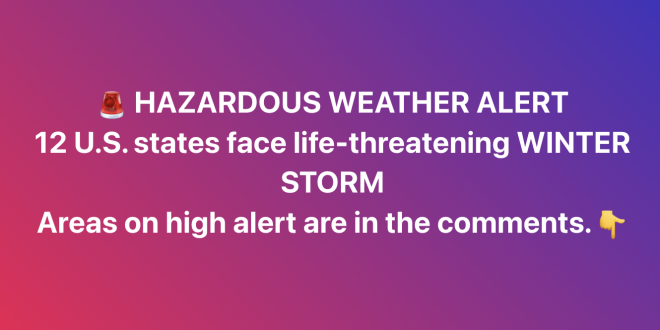A significant winter storm is moving through 12 states in the U.S., prompting officials to advise residents to prioritize safety and preparedness.
A powerful winter storm is hitting twelve states in the U.S., unleashing a combination of heavy snow, ice, and strong winds. Weather officials are advising those in the impacted regions to remain vigilant, make necessary preparations, and focus on their safety as the storm is anticipated to persist until Saturday.
Warnings have been issued by the National Weather Service (NWS) for several states, including Arkansas, Oklahoma, Mississippi, Missouri, Tennessee, Texas, New Mexico, Louisiana, Kentucky, Illinois, Pennsylvania, and West Virginia. The alerts emphasize the serious conditions and possible dangers associated with the storm, underscoring the importance for residents to stay updated and take appropriate precautions.
Hazardous Situations and Travel Difficulties
The storm that’s currently happening is making travel really dangerous in a lot of areas. Heavy snowfall and ice are creating very slippery roads, and the strong winds are making visibility dangerously low. Due to these factors, Winter Storm Warnings have been issued and are expected to stay in effect for several areas until Saturday morning. Here are the most recent updates from the National Weather Service, along with important safety tips for anyone in the storm’s path.
Severe Weather Warnings for Saturday
On Saturday, the National Weather Service has issued specific warnings for parts of East Arkansas, North Mississippi, Southeast Missouri, and West Tennessee regarding the upcoming weather conditions. The warning will be in effect from 6 p.m. on Thursday until 6 a.m. on Saturday, Central Standard Time (CST).
People living in these areas can look forward to about 4 to 6 inches of snow. Also, there may be some light ice buildup in certain areas, making surfaces slick and raising the chances of accidents. Counties like Tallahatchie, Yalobusha, Calhoun, Chickasaw, and Monroe are expected to see up to 2 inches of snow, with icy spots likely forming, particularly on bridges and overpasses. Cities such as Bruce, Water Valley, Aberdeen, Amory, and Charleston are expected to experience especially dangerous travel conditions because of the mix of snow and ice.
Winter Storm Warnings for Thursday
Besides the areas already noted, parts of West Virginia and nearby regions are facing Winter Storm Warnings that will remain in effect until Thursday at noon, Eastern Standard Time (EST). These regions are preparing for heavy snowfall and powerful winds that could escalate the danger of the weather conditions.
In Eastern Tucker County, including towns such as Thomas, Canaan Valley, and Davis, snowfall is anticipated to reach totals of 4 to 8 inches. Expect strong winds reaching up to 40 mph alongside the snowfall, with wind chills plummeting to a frigid -10°F to -15°F overnight. In these harsh conditions, the chances of frostbite and hypothermia rise significantly, so it’s crucial for residents to keep warm and minimize their time outside.
Western Grant and Western Pendleton Counties are in the storm’s path, anticipating up to 4 inches of snow. In these areas, wind gusts might hit 50 mph, making the roads slick and tough to drive on. Northwest Pocahontas, Southeast Randolph, and Southeast Webster Counties are expected to get about 4 to 6 inches of snow, along with wind gusts reaching up to 45 mph. These conditions are expected to create unsafe roadways and travel disruptions, so it’s important for residents to steer clear of unnecessary trips.
The Ongoing Effects of Friday
As the storm moves into Friday, we can expect the dangerous conditions to persist, especially during the morning and evening rush hours. Traveling will be risky for anyone who needs to be out and about due to icy roads, limited visibility, and continuous snow buildup. The effects could last into Saturday morning, extending the stretch of severe weather.
The NWS is urging residents to stay off the roads if they can help it. If you need to travel, it’s a good idea to put together an emergency kit. Make sure to include essentials like water, non-perishable food, a flashlight, warm clothing, and blankets. It’s really important to have these items ready, especially when unexpected delays or emergencies arise due to the storm.
Important Safety Tips
During this severe winter storm, staying safe is our main concern. Here are some important safety tips to keep residents safe:
Stay Indoors: The safest choice during the storm is to keep yourself inside. It’s best to stay home if you don’t have to go out; it keeps you safe from the hazardous conditions outside.
Bundle Up: If you need to head outside, be sure to put on several layers of warm clothes. It’s really important to cover any exposed skin to avoid frostbite and hypothermia, particularly in places where the wind chill is extremely low.
Emergency Kit: If you’re planning to travel, keeping an emergency kit in your vehicle can really make a difference. Don’t forget to pack essentials such as water, snacks, a flashlight, extra batteries, warm clothing, and blankets.
Before you head out, make sure to check the latest road conditions. You can do this by calling 511 or visiting the NWS website. Being aware of the current road conditions can guide you in determining if it’s safe to hit the road.
Be Careful on the Road: If you need to drive, go slowly and give yourself plenty of time to get where you’re going. Maintain a safe distance from other cars and stay alert for any sudden stops or shifts in road conditions.
Stay updated: Pay attention to weather reports and heed any guidance or warnings from local officials. Keeping yourself updated can lead to smarter choices regarding your safety.
Grasping Weather Alerts
Understanding the various types of weather alerts issued by the NWS is crucial for knowing how to respond effectively.
A Winter Storm Warning is put in place when there’s a strong chance of harsh winter weather. This can include heavy snowfall—usually around 5 inches within 12 hours or 7 inches over 24 hours—along with serious ice buildup or other dangerous conditions that could threaten lives. In places with distinct geographical characteristics, such as Allegany and Highland counties, there are stricter guidelines in place. A warning is issued only if there is at least 6 inches of snow within 12 hours or 8 inches within 24 hours.
Winter Weather Advisory: This notice is for milder conditions, like 2 to 4 inches of snow or some light freezing rain. An advisory, though not as severe as a warning, still suggests that there could be travel disruptions and hazardous conditions that residents need to keep in mind.
Effects on the Region and How the Community is Responding
This storm is hitting many communities all at once, causing widespread impact. Local governments and emergency services are coming together to help those in need and to make sure that essential services continue to run smoothly. In the areas most affected, schools and businesses might shut down or postpone their openings to ensure everyone’s safety.
Neighbors are coming together to support each other, reaching out to the elderly and those with limited mobility to make sure they have everything they need during the storm. Community centers are welcoming people in as warming stations for those who may be without heat or shelter.
Getting Ready for Upcoming Storms
This storm serves as a timely reminder of how crucial it is to be ready for winter weather. Check out these tips to prepare for upcoming storms:
Home Preparedness: Ensure your home is stocked with all the winter essentials. It’s important to have a stock of non-perishable food, bottled water, and any essential medications on hand. Make sure your heating system is functioning well, and have backup heating options ready in case the power goes out.
Vehicle Readiness: Ensure your vehicle is well-maintained for the winter season. Make sure you have snow tires or chains, a full gas tank, and an emergency kit ready to go. Keeping up with regular maintenance can help avoid breakdowns when it matters most.
It’s a good idea to have a list of emergency contacts readily available. This should include local shelters, utility companies, and your family members. Being aware of who to reach out to in an emergency can really make a difference in saving valuable time.
Keep yourself updated: Subscribe to weather alerts and updates from trustworthy sources. Staying informed about the weather ahead allows you to get ready and react in the right way.
Be Prepared: It’s important to have a strategy ready for dealing with severe weather situations. It’s important to understand where to find shelter, how to keep warm, and what actions to take if you find yourself stranded.
Why Community and Solidarity Matter
In times of harsh weather, a community’s resilience is truly put to the test. We should keep in mind that lending a hand to one another can truly create a meaningful impact. Shoveling snow for a neighbor, sharing resources, or just checking in on someone who might need a hand—each little act of kindness makes a big difference in helping our community face the challenges brought on by the storm.
Community organizations and volunteer groups are essential in offering support. By distributing emergency supplies and establishing warming stations, these organizations make sure that everyone has support during the storm.
Enduring Effects and Healing
After the storm has moved on, the recovery will need the focus and hard work of everyone in the impacted communities. Power outages, fallen trees, and damaged infrastructure are frequent problems that require prompt attention. Local authorities are committed to restoring services as quickly as they can, but it’s important to remember that recovery may take some time, particularly in extensive areas.
Residents might have to tackle cleanup efforts, fix damaged property, and manage any ongoing transportation challenges. Staying patient and working together during the recovery phase is crucial as we help one another rebuild and find our way back to normalcy.
Being Safe and Ready
This intense winter storm is a clear reminder of how unpredictable and occasionally perilous severe weather can be. The path of this event stretches across twelve states, creating a far-reaching impact that touches the lives of many individuals and communities. By keeping up with the latest information, adhering to safety protocols, and being there for each other, residents can make it through the storm safely.
The warnings from the National Weather Service emphasize how serious the situation is, encouraging everyone to take the right steps to keep themselves and their families safe. Staying indoors, putting together an emergency kit, or lending a hand to a neighbor in need—every little thing we do makes a difference in keeping everyone safe during these tough times.
With the storm still going strong, it’s important to stay alert and ready for any shifts in the weather. By focusing on safety and keeping in touch with trustworthy information sources, people in the affected states can face the storm together, coming out stronger and more resilient afterward.
Keep warm, look out for each other, and take care as this winter storm moves through the country.
 Viral Hatch US/UK No.1 News Portal
Viral Hatch US/UK No.1 News Portal







